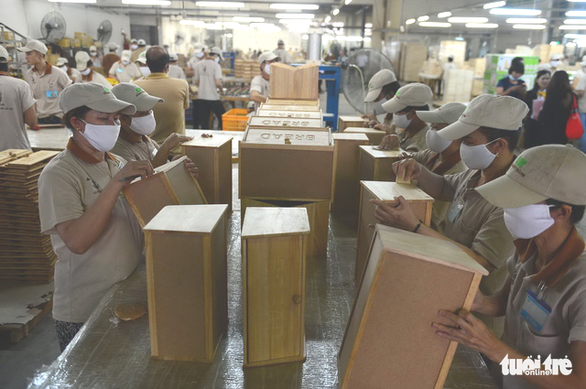Contrary to the high number of orders early this year, many enterprises in the wood and wooden furniture sector in Vietnam are seeking ways to boost sales in the domestic market and access new export markets to maintain production and business as well as minimize losses.
These firms are facing multiple difficulties in capital, labor costs, and input materials.
Order cancelation
Nguyen Van Sang, director of Viet Products Import Export Corporation (Viet Products), said the firm is boosting sales in the local market as its export orders have suddenly fallen over 30 percent since July, despite impressive results in the first half.
The company continuously runs promotion and discount programs for outdoor furniture products.
Sales have improved but remain lower than expected.
Boosting domestic market sales is the only solution for Viet Products since importers from the U.S. requested a temporary freeze on their orders although products for these orders are already being produced.
Some importers even canceled their orders without advance notice.
“Importers tended to make payments within some 30 days after receiving products, but such payments are now made late as importers cannot sell goods," Sang said.
“If the situation goes on, Vietnamese producers will face risks as they still have to pay production costs and loan interest."
Phung Quoc Man, general director of Bao Hung Company, which specializes in wooden furniture, said the company is seeking ways to increase exports to Japan and South Korea, which are facing lower inflation than other countries.
As for the U.S. market, despite a decline in orders, Bao Hung will focus on products with less competition.
This is also Vietnamese enterprises’ solution to cope with the reduction of wood exports to Europe and the U.S..
“Some enterprises have focused on the domestic market to maintain production amid the stalemate in export markets,” Man added.
It is not easy to change business plans but the solution helps local wood and wooden furniture enterprises reduce losses when multiple orders of international partners are being downsized, frozen or even canceled.
According to Man, some importers have suggested leaving products in Vietnamese companies’ warehouses, reasoning that their storage is full.
They have also proposed making payments late.
Hard to get bank loans
The fate of Viet Products and Bao Hung is not clear in the wood sector.
According to the latest survey by the Handicraft and Wood Industry Association of Ho Chi Minh City (HAWA), 47 out of the 52 participating enterprises reported a fall in their export orders.
Up to 14 respondents faced a reduction of 70-90 percent in orders, while 18 others posted a decrease of 30-60 percent.
Only 15 firms saw a decline of 10-30 percent, while five others bucked the trend with an increase of 10-30 percent in the number of orders.
Nguyen Chanh Phuong, vice-chairman of HAWA, said Vietnam’s key export markets had shown signs of stagnation since April.
In May and July, the situation worsened.
In July, Vietnam’s wood and wooden furniture exports fell 6-7 percent. The U.S. market even reported a double-digit decline.
Vietnamese firms exporting products to Europe encounter further difficulties related to the exchange rate.
These enterprises make payments in U.S. dollars for material imports but sell their products in euros, so they receive payments for their products late, affecting their loan repayment and sending their production costs rising.
In addition, wood enterprises are finding it hard to access bank loans. More than half of the enterprises surveyed, specifically 29, said they were not offered a loan payment deadline extension and had to borrow loans at high interest rates.
Due to the decline in new orders, some wood firms weighed downsizing their workforce or asking their workers to work in shifts.
“After the COVID-19 pandemic is kept at bay, enterprises have striven to recruit laborers to maintain their production and have reported impressive results," HAWA vice-chairman Phuong said.
“However, current difficulties have put companies at a disadvantage again.”
At present, enterprises with good investment can reduce operation costs, Man from Bao Hung Company said, adding that if they develop products selling for more competitive prices, they can retain customers and overcome the difficulties.
HAWA will propose the government remove obstacles in accessing bank loans. It is really a problem as enterprises need capital to maintain their production and business activities while bank loans cannot be accessed.
“Enterprises have suggested cutting loan interest rates, land taxes, and social insurance premiums in two or three years," Phuong added.
“They have also proposed reducing the frequency of inspections by state management agencies.”
HAWA’s survey also features enterprises’ complaints about complicated administrative procedures.
While companies are facing a plunge in their production capacity, fixed costs, such as social insurance premiums, are increasing.
Additionally, enterprises find it hard to access the government’s support policies.
Like us on Facebook or follow us on Twitter to get the latest news about Vietnam!



















































